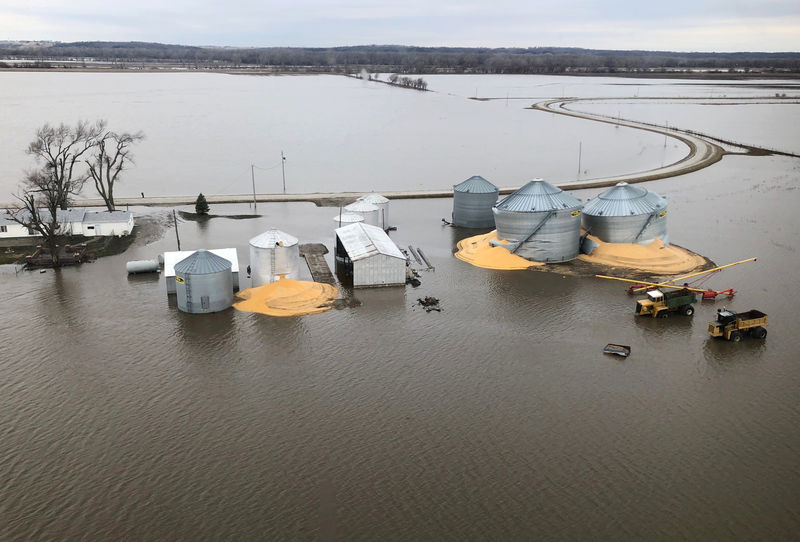By P.J. Huffstutter
CHICAGO (Reuters) - Months after historic floods ravaged the U.S. Midwest, farmers scrambling to harvest their crops face a new headache: finding fuel to dry their soaked grains.
Normally, farmers use propane as fuel for grain dryers to reduce moisture levels in corn crops to ready for sale or to safely store the grain.
But the extraordinarily wet spring delayed planting, and a waterlogged fall delayed harvesting and produced wet crops. That caused a surge in propane demand among crop farmers, even as livestock producers are buying to keep their barns warm and rural homeowners try to heat their homes - all of which is straining aging infrastructure used to deliver that fuel. And keeping people and animals warm takes precedence over grain drying.
It adds to the season of woe for Midwestern farm communities, which are contending with rising bankruptcy rates, slumping farm incomes and lackluster exports as the U.S.-China trade war drags on.
"Everyone is trying to harvest all at the same time, and they need more propane to keep their dryers running," said Dan Smith, owner of Smith Propane & Lube Inc in Lake Crystal, Minnesota. "I've got two trucks from farmers parked outside, waiting."
As of Friday, his tanks were dry. His drivers were scattered across the Midwest, with one as far as Kansas, in search of fuel. He's not alone. Propane suppliers in Wisconsin, Minnesota and Iowa are experiencing increased demand from out-of-state fuel sellers, trade groups said.
Propane prices have surged by about 20% in October as sellers scramble to find enough fuel across the Midwest to satisfy customers. For example, propane for delivery at the Conway hub in Kansas soared to 51 cents a gallon on Monday from 37.5 cents a month ago.
Much of the U.S. corn belt relies on a fragmented supply network of pipelines, trains and trucks to keep pace with propane demand. That infrastructure this year has not been able to keep pace with the unexpected spike in demand.
By this time of year, three-fourths of the corn crop has typically been harvested, and the fuel demand would have been staggered. But only 52% of the corn crop has been harvested as of Sunday, according to federal data, as farmers are inundated with wet fields.
'EVERYONE IS HARVESTING WET CORN'
The longer these crops sit out in the field, or are stored wet in a storage bin, the greater the risk of them being damaged and facing steep discounts from buyers.
"Because the corn is wetter, we have to dry it all night to try to keep up," said Shane Goplin, 45, who farms 1,700 acres of corn in Trempealeau County, Wisconsin. He has been sleeping inside a shed next to his corn dryer to keep an eye on the machine and make sure not a drop of fuel is wasted.
"The problem is everyone is harvesting wet corn," he said.
The supply crunch prompted the governors of Iowa, Minnesota, North Dakota and Wisconsin in recent days to sign executive orders temporarily lifting regulations restricting what hours commercial drivers can transport propane, gasoline and diesel fuel to retail suppliers, to try to get the fuel to farmers and farm cooperatives as fast as possible.
The unexpectedly high demand resulted in two propane terminals in Iowa on ONEOK's (N:OKE) North System to have temporary inventory outages recently, company spokesman Brad Borror said in a statement. The outages lasted less than 24 hours, Borror said, and the company "is working diligently to timely deliver propane to the region."
As of last week, overall U.S. propane inventories were 99.8 million barrels, 20% more than at this time last year. But most of that growth is in the U.S. Gulf Coast.
In the Midwest, stocks are 3.3% lower than last year, according to U.S. Energy Department figures, and pipeline infrastructure is not robust enough to get those barrels to the corn belt quickly enough.
Deb Grooms, chief executive of the Iowa Propane Gas Association, said supply is not the problem. It is demand and existing infrastructure.

"We are now in a world where the pipeline, which hasn't been updated, was fine in the 1960s," Grooms said. "The system hasn't kept up. We're seeing a perfect storm."